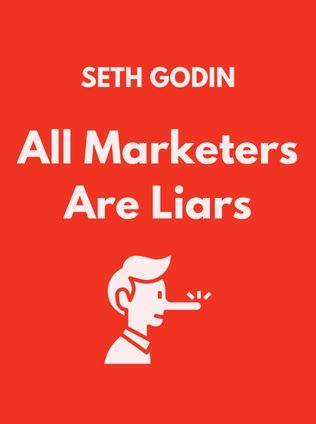
All Marketers are Liars
The Power of Telling Authentic Stories in a Low-Trust World
By Seth Godin
Published 01/2005
About the Author
Seth Godin, a towering figure in the world of modern marketing, is a writer, entrepreneur, and an inspirational speaker who has transformed the way we perceive marketing. Born in 1960, Godin’s journey into the world of marketing was not linear but was shaped by his diverse experiences and innate curiosity about human behavior. With an MBA from Stanford University, Godin embarked on a career that would see him redefine the boundaries of marketing. His works, including bestsellers like "Purple Cow," "Tribes," and "Linchpin," have inspired millions to think differently about how products and ideas are marketed. His approach is unique in that it merges psychological insight with practical strategies, encouraging marketers to think of themselves as storytellers who can create meaningful connections with their audiences. In "All Marketers Are Liars," published in 2005, Godin delves into the concept of storytelling in marketing, asserting that the stories marketers craft are what truly sell products, not the products themselves.
Main Idea
"All Marketers Are Liars" is a book that challenges conventional notions of marketing by positing that the most successful marketers are not those who simply advertise products but those who tell compelling stories. According to Godin, consumers do not buy products because of their inherent qualities; rather, they buy them because of the way these products make them feel. The stories that marketers create—stories that resonate with consumers’ emotions, beliefs, and worldviews—are what truly drive sales. In essence, Godin argues that marketing is less about the product and more about the narrative that surrounds it. By crafting stories that align with the consumers' deeply held beliefs, marketers can create strong, emotional connections that make their products indispensable in the lives of their customers.
Table of Contents
- Introduction
- New Marketing 101
- The Power of Storytelling
- Principle 1: Appeal to a Worldview
- Principle 2: Understand How Your Customer Thinks
- Principle 3: Make a Good First Impression
- Principle 4: Tell a Believable Story
- Principle 5: Use Obstacles to Tell a Better Story Next Time
- Conclusion
New Marketing 101
In the opening chapters, Godin dismantles the traditional concepts of marketing that have dominated the industry for decades. He argues that the old ways—mass advertising aimed at fulfilling consumer needs and wants—are no longer effective in an age where consumers have become more discerning and technology has advanced exponentially. According to Godin, the essence of marketing has shifted from selling products to spreading ideas. Whether it is a product, a service, a political candidate, or even a belief system, everything can be marketed by leveraging the power of storytelling.
Godin emphasizes that the modern marketplace is not just a venue for exchanging goods; it is a vast arena where ideas compete for attention. This shift from products to ideas requires marketers to focus less on the tangible aspects of what they are selling and more on the intangible—on how their stories resonate with consumers’ worldviews. Godin provocatively asserts that "customers are in charge," highlighting the shift in power from producers to consumers. In this new landscape, marketers must be more attuned to their audiences, understanding their desires, beliefs, and the stories they tell themselves.
Understanding the Marketplace
The modern marketplace, as Godin describes it, is a place where the exchange of ideas is just as important as the exchange of goods. This new reality requires marketers to be storytellers, weaving narratives that resonate deeply with consumers. In the past, marketing was often about volume—reaching as many people as possible with a single message. However, Godin argues that this approach is outdated. In today’s world, where consumers are bombarded with information from all sides, the key to successful marketing lies in the ability to tell stories that cut through the noise and connect on an emotional level.
Godin explains that the most effective stories are those that align with the worldview of the target audience. A worldview is a set of beliefs, values, and biases that shape how individuals see and interact with the world. For example, someone who follows a Keto diet has a different worldview from someone who follows a plant-based diet. Both are seeking health and nutrition, but their methods and beliefs are different. A successful marketer understands these differences and crafts stories that not only address the consumer's needs but also validate their worldview. By doing so, the marketer makes the consumer feel understood and appreciated, which in turn builds loyalty and trust.
Sign up for FREE and get access to 1,400+ books summaries.
You May Also Like
The Subtle Art of Not Giving a F*ck
A Counterintuitive Approach to Living a Good Life
By Mark MansonRich Dad Poor Dad
What the Rich Teach Their Kids About Money - That the Poor and Middle Class Do Not!
By Robert T. KiyosakiHow To Win Friends and Influence People
The All-Time Classic Manual Of People Skills
By Dale CarnegieQuiet: The Power of Introverts
The Power of Introverts in a World That Can't Stop Talking
By Susan Cain



















